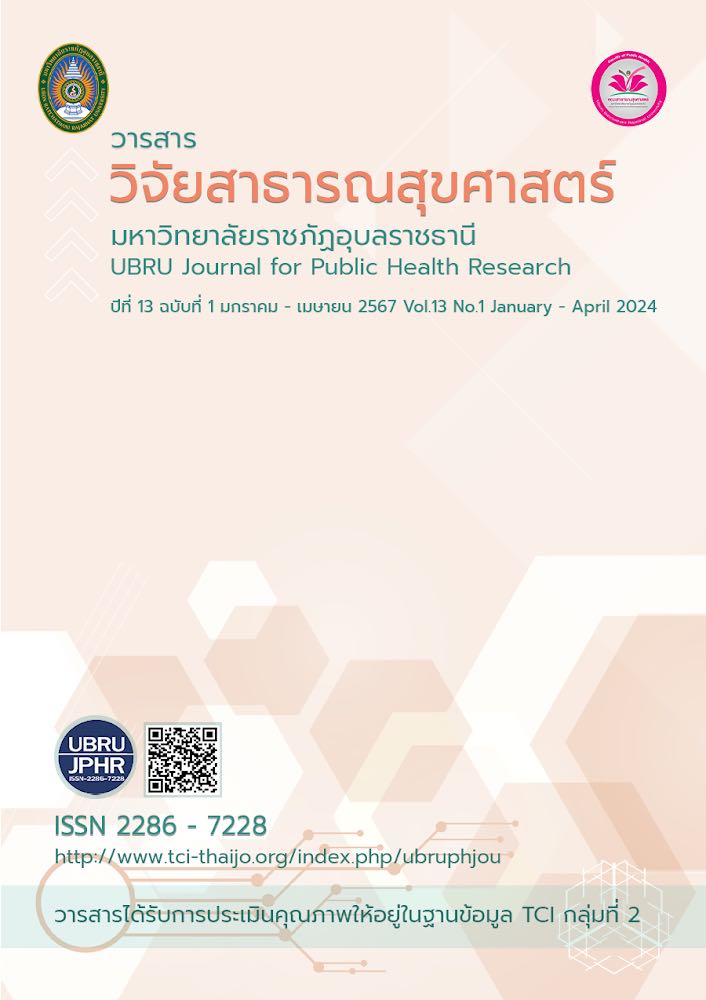Mobile phone usage behavior on risk of developing nomophobia disease among undergraduate students, Faculty of Public Health, Ubon Ratchathani Rajabhat University
Keywords:
Telephone usage behavior, nomophobia, mobile phoneAbstract
This survey research aimed to study behavior of mobile phone usage behavior on nomophobia among undergraduate students in the Faculty of Public Health. Ubon Rajabhat University. A relationship between knowledge, attitude and behavior was also identified. The samples were 260 undergraduate students in the Faculty of Public Health. Ubon Rajabhat University., recruited by stratified random sampling. The research instruments consisted of personal data, knowledge, attitude and behavior of mobile phone usage behavior on nomophobia questionnaire. The reliabilities of research tools were 0.92. Data were analyzed using descriptive statistics and Pearson correlation coefficient. the results showed that students spent more than 6 hours a day on mobile phone. 83.85 percent of the sample had risk behavior from mobile phone use. The most of them had a high level of behavior (76.92), a moderate level of attitude (67.30) and a high of knowledge (62.30). Knowledge and attitude of mobile phone usage behavior on nomophobia among students had a statistically significant relationship with behavior of mobile phone usage behavior on nomophobia (p<.001). Moreover, Knowledge had a statistically significant relationship with attitude of mobile phone usage behavior on nomophobia (p<.001). The study highlights that knowledge and attitude related to risk behavior on nomophobia. Educators, therefore, should encourage knowledge and change mobile phone usage attitude and behavior for decreasing a risk of nomophobia among students.
References
กุลนารี ภวภูตานนท์. (2562). โรคติดมือถือ หรือโนโมโฟเบีย. สืบค้นเมื่อ 2 ตุลาคม 2566 จาก https://physicaltherapy.swu.ac.th/article/2673#
บีบีซีนิวซ์ไทย. (2561). เทคโนโลยี: เล่นมือถือเกินวันละ 7 ชม. อาจทำเปลือกสมองเด็กบางก่อนวัยอันควร. สืบค้นเมื่อ 2 ตุลาคม 2566 จาก https://www.bbc.com/thai/features-46709708#:~:text
ศักดิกร สุวรรณเจริญ, สุพัตรา ธรรมาอินทร์, สุวัฒนา เกิดม่วง, อังค์ริสา พินิจจันทร์,พรเลิศ ชุมชัย. (2562). พฤติกรรมและผลกระทบจากการใช้สมาร์ทโฟนของนักเรียนมัธยมศึกษาตอนปลาย จังหวัดนนทบุรี. วารสารพยาบาลกระทรวงสาธารณสุข. 29(3):107-117.
ศักดิกร สุวรรณเจริญ, สุพัตรา ธรรมาอินทร์, สุวัฒนา เกิดม่วง, อังค์ริสา พินิจจันทร์, พรเลิศ ชุมชัย. (2019). พฤติกรรมและผลกระทบจากการใช้สมาร์ทโฟนของนักเรียนมัธยมศึกษาตอนปลาย จังหวัดนนทบุรี. วารสารพยาบาลกระทรวงสาธารณสุข. 29(3):107-117.
เอกลักษณ์ วัชรการ. (2564). การใช้เทคโนโลยีกับการดำเนินชีวิตของวัยรุ่น. สืบค้นเมื่อ 27 กันยายน 2566 จาก https://www.gotoknow.org/posts/410843
เอื้อมทิพย์ ศรีทอง. (2562). พฤติกรรมการใช้โทรศัพท์มือถือของนักศึกษา สาขาสังคมศึกษามหาวิทยาลัยราชภัฏเทพสตรี. วารสารมหาจุฬาวิชาการ. 6(ฉบับพิเศษ): 26-38.
Cutting, A. Technologies, E. (2566). ความจำเป็นของโทรศัพท์มือถือในปัจจุบัน. สืบค้นเมื่อ 17 กันยายน 2566 จาก https://alrakiza.com/
Çatıker, A. Deniz, G. Büyüksoy, B. Özdi̇l, K. (2021). Is there a relationship between nursing students’ smartphone use, their fear of missing out and their care-related behaviour. 54:103111:1-8
Ko, Y. Park, S. (2023). Analyzing the Caregivers' behavioral patterns in managing their young Children's smartphone Use in South Korea. Journal of Pediatric Nursing.72: 84-91
Lin, Y. Louise C. M. (2021). A look at engagement profiles and behavior change: A profile analysis examining engagement with the Aim2Be lifestyle behavior modification app for teens and their families. Preventive Medicine Reports.24, 101565:1-8
Thinknet. (2566). วิวัฒนาการการสื่อสารของแต่ละยุคแบบเข้าใจง่าย The Evolution of Communication. สืบค้นเมื่อ 17 กุมภาพันธ์ 2566 จาก https://www.thinknet.co.th/
Downloads
Published
How to Cite
Issue
Section
License
Copyright (c) 2024 คณะสาธารณสุขศาสตร์ มหาวิทยาลัยราชภัฏอุบลราชธานี

This work is licensed under a Creative Commons Attribution-NonCommercial-NoDerivatives 4.0 International License.
เนื้อหาและข้อมูลในบทความที่ลงตีพิมพ์ในวารสารวารสารวิจัยสาธารณสุขศาสตร์ มหาวิทยาลัยราชภัฏอุบลราชธานี ถือเป็นข้อคิดเห็นและความรับผิดชอบของผู้เขียนบทความโดยตรงซึ่งกองบรรณาธิการวารสาร ไม่จำเป็นต้องเห็นด้วย หรือร่วมรับผิดชอบใดๆ
บทความ ข้อมูล เนื้อหา รูปภาพ ฯลฯ ที่ได้รับการตีพิมพ์ในวารสารนี้ ถือเป็นลิขสิทธิ์ของวารสารฯ หากบุคคลหรือหน่วยงานใดต้องการนำทั้งหมดหรือส่วนหนึ่งส่วนใดไปเผยแพร่ต่อหรือเพื่อกระทำการใดๆ จะต้องได้รับอนุญาตเป็นลายลักอักษรณ์จากบรรณาธิการวารสารนี้ก่อนเท่านั้น


